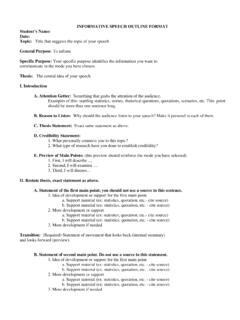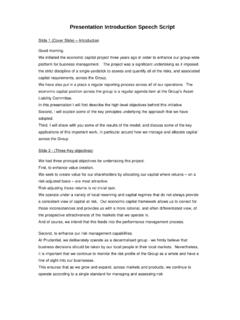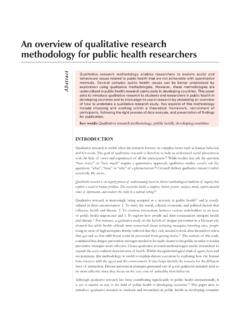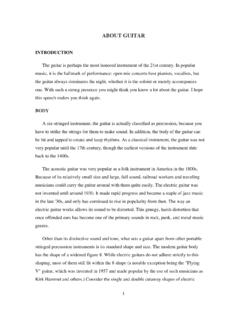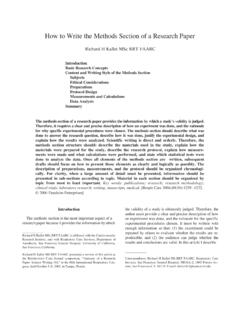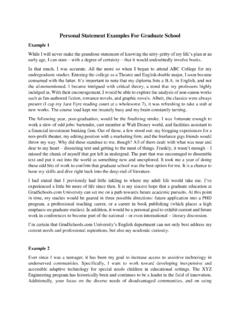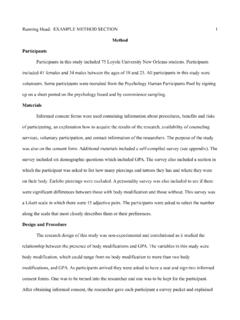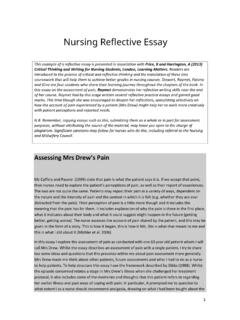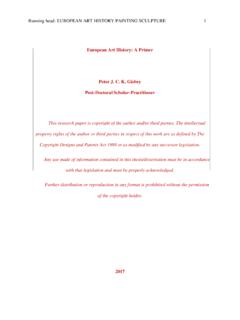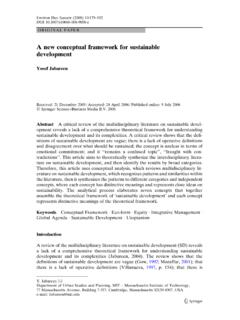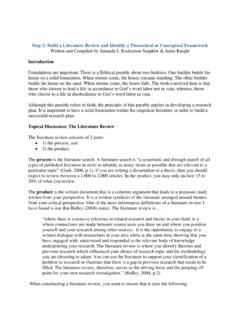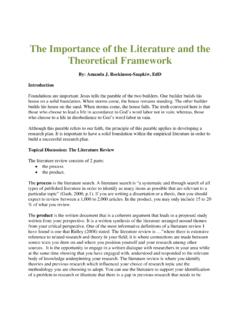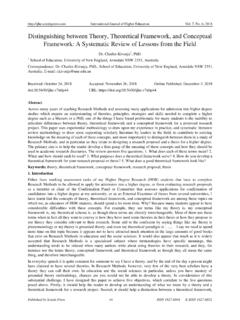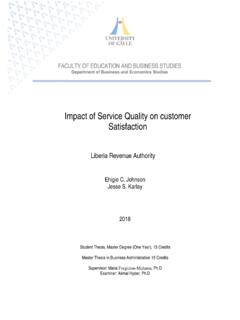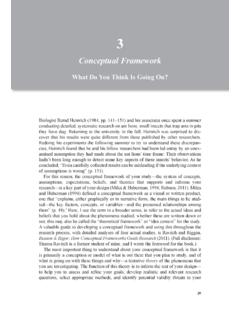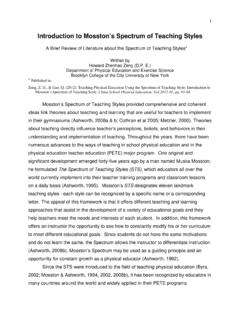Transcription of Theoretical Framework Example Of A Research Paper
1 ABSTRACT Theoretical and conceptual frameworks guide the paths of a Research and offer the foundation for establishing its credibility. Though these terms seem similar, they are different from each other in concept and in their roles in the Research inquiry. However, many students find it difficult and confusing to distinguish between these two closely related frameworks while defining their roles in their Research . Yet, the inclusion of a Theoretical and/or conceptual Framework is a mandatory requirement in a thesis or dissertation that shows the student s map of the Research s/he seeks to undertake. A good comprehension of both frameworks would inure to a good investigation. This article explains the meanings of the terms, their importance in the Research process, their difference and similarities while offering insightful suggestions on how they can be constructed and utilized for a particular Research .
2 introduction The Theoretical and conceptual Framework explains the path of a Research and grounds it firmly in Theoretical constructs. The overall aim of the two frameworks is to make Research findings more meaningful, acceptable to the Theoretical constructs in the Research field and ensures generalizability. They assist in stimulating Research while ensuring the extension of knowledge by providing both direction and impetus to the Research inquiry. They also enhance the empiricism and rigor of a Research . Thus, it is no exaggeration for Imenda (2014) to say that both the Theoretical and conceptual frameworks give life to a Research . Unfortunately, many postgraduate students and faculty staff at universities are confused of the two terms and apply them wrongly in their Research papers. As a result, their Research findings become weak because of the inappropriate application of a suitable Theoretical fra mework an d/ or con ceptu al fra mework.
3 T hi s blu rs th e understanding of readers of the Research Paper who are lost, not knowing the purpose of the study, the importance of the study and the scholars the researcher is in dialogue with, whether in agreement or disagreement (Evan, 2007). A Research without the Theoretical or conceptual Framework makes it difficult for readers in ascertaining the academic position and the underlying factors to the researcher s assertions and/or hypotheses. This renders the Research sloppy and not appreciable as contributing significantly to the advancement of the frontiers of knowledge. This article explains with clear understanding, the two frameworks and how they could be utilized efficiently in the Research expedition. What is a Theoretical Framework ? It is the blueprint or guide for a Research (Grant & Osanloo, 2014). It is a Framework based on an existing theory in a field of inquiry that is related and/or reflects the hypothesis of a study.
4 It is a blueprint that is often borrowed by the researcher to build his/her own house or Research inquiry. It serves as the foundation upon which a Research is constructed. Sinclair (2007) as well as Fulton and Krainovich-Miller (2010) compare the role of the Theoretical Framework to that of a map or travel plan. Thus, when travelling to a particular location, the map guides your path. Likewise, the Theoretical Framework guides the researcher so that s/he would not deviate from the confines of the accepted theories to make his/her final contribution scholarly and academic. Thus, Brondizio, Leemans, and Solecki (2014) concur that the Theoretical Framework is the specific theory or theories about aspects of human endeavor that can be useful to the study of events. The Theoretical Framework consists of Theoretical principles, constructs, concepts, and tenants of a theory (Grant & Osanloo, 2014). In a postgraduate thesis or dissertation Research , all aspects of the Research are expected to connect to the Theoretical Framework (Grant & Osanloo, 2014).
5 The student must tactfully select the relevant theory or theories that underpin the knowledge base of the phenomenon to be investigated. The student is expected to make a unique application of the selected theory so as to apply the Theoretical constructs to his/her dissertation study. The Importance of Theoretical Framework in Research The Theoretical Framework offers several benefits to a Research work. It provides the structure in showing how a researcher defines his/her stu dy philosophically, epistemologically, methodology and analytically (Grant & Osanloo, 2014). Ravitch and Carl (2016) concur that the Theoretical Framework assist researchers in situating and contextualizing formal theories into their studies as a guide. This positions their studies in scholarly and academic fashion. Moreover, the Theoretical Framework serves as the focus for the Research and it is linked to the Research problem under study.
6 Therefore, it guides a researcher s choice of Research design and data analysis plan. The Theoretical Framework also guides the kind of data to be accrued for a particular study (Lester, 2005). The Theoretical Framework , thus, aids the researcher in finding an appropriate Research approach, analytical tools and procedures for his/her Research inquiry. It makes Research findings more meaningful and generalizable (Akintoye, 2015). Imenda (2014) clearly posits that a Research without the Theoretical Framework lacks accurate direction to the search of appropriate literature and scholarly discussions of the findings from the Research . For other scholars in the field of inquiry, the Theoretical Framework provides a common worldview or lens from which to support one s thinking about the problem and analysis of data (Grant & Osanloo, 2014). The Theoretical Framework guides and should resonate with every aspect of the Research process from the definition of the problem, literature survey, methodology, presentation and discussion of the findings as well as the conclusions that are drawn.
7 Eisenhart (1991) contends that the Theoretical Framework helps the researcher in considering alternative theories that might challenge his or her perspective, thereby enriching the strengths of the study. Simon and Goes (2011) as well as Maxwell (2004) aver that Theoretical frameworks deepen the essence of the study. Thus, Research proposals that require funding must clearly show the Theoretical Framework that pivots the intended Research . It convinces funding agencies that the Research inquiry is worth supporting. For scholars in the field and readers, the proper selection and presence of a Theoretical Framework convinces them that the study is not based on the personal instincts of the researcher but rather is firmly rooted in an established theory selected via credible studies (Akintoye, 2015). How to Select a Suitable Theoretical Framework There is no one perfect or right theory for a dissertation, though certain theories are popular (Grant & Osanloo, 2014).
8 Yet, the adoption or KEYWORDS Other parts of culture Cultural core Environment adaptation of a theory must reflect the understanding of the researcher regarding the study and must drive the study (Simon & Goes, 2011). The selection of a Theoretical Framework requires a thorough understanding of the problem, purpose, significance and Research questions of a study. This is important because when the selection is poorly done, it would be as if the researcher is using a wrong bolt to forcibly fix a wrong nut. The chosen Theoretical Framework must accentuate the purpose and importance of the study dissertation (Grant & Osanloo, 2014). To make an appropriate selection of a Theoretical context, the researcher must consider the guiding principles of the study and situate the problem in relation to it. The Research questions of the study and the purpose of the study must entail noticeable aspects of the Theoretical Framework and must agree with the assertions promulgated by the theorists of the selected theory (Maxwell, 2004; LoBiondo-Wood, 2010).
9 After the entire study has been conducted, the Research findings accrued from the study must corroborate, extend, or modify the existing theory that was borrowed for the study (Lester, 2005). The researcher may critique, develop and/or expand the theory that served as a guide for his/her study vis- -vis the findings gleaned from the study (Grant & Osanloo, 2014). Munhall and Chenail (2008) contend that this critique is often carried out in the data analysis stage of the Research before the final conclusions of the study are drawn. Grant and Osanloo (2014) present a checklist that can aid researchers to be able to identify the suitable Theoretical Framework for their Research inquiry. The authors have succinctly put them into questions that must be reliably answered by the researcher to convince him/her that the selection of a theory or theories is appropriate for a particular study.
10 These questions are: 1. What discipline will the theory be applied to? 2. Does the theory agree with the methodology plan for the study? 3. Is the theory to be selected well developed with many Theoretical constructs? 4. Have specific concepts or Theoretical principles been selected to meet the objectives of the study? 5. Does the problem of the study, the purpose and importance of the study correlate with the Theoretical Framework ? 6. Can the theory be used hand in hand with the Research questions for the study? 7. Does the Theoretical Framework inform the literature review? 8. Does the data analysis plan agree with the selected Theoretical Framework ? 9. Does the Theoretical Framework undergird the conclusions and recommendations based on the data analysis? Simon and Goes (2011) also suggest some points that can help articulate the theory for an informed Research . The important keys the researcher have to satisfy include: 1.

